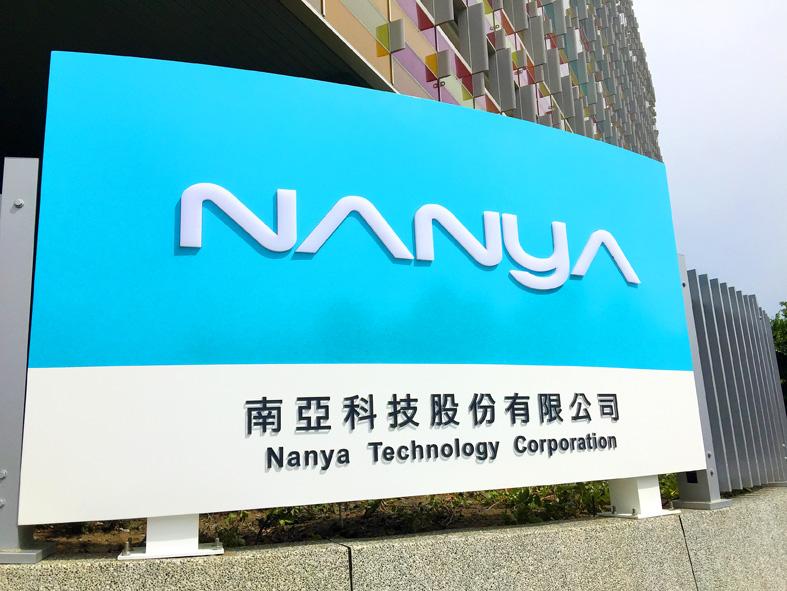DRAM chipmaker Nanya Technology Corp (南亞科技) yesterday reported its best monthly revenue in 29 months as prices jumped amid a remote-working and schooling trend, which has exacerbated a chip shortage.
Revenue last month was NT$6.4 billion (US$224.67 million) amid the COVID-19 pandemic-driven trend, Nanya said.
Revenue expanded 10.65 percent from NT$5.79 billion in February, mainly due to price increases, it said.

Photo: Hung Yu-fang, Taipei Times
On an annual basis, revenue jumped 19.64 percent from NT$5.36 billion, it said.
Revenue in the first three months grew about 20 percent to NT$17.73 billion from NT$14.77 billion in the fourth quarter of last year, and soared 22.87 percent from NT$14.42 billion in the first quarter of last year.
“Demand in the first quarter was quite positive, lifting prices and shipments,” Nanya deputy spokesman Joseph Wu (吳志祥) said by telephone yesterday. “The recovery in demand spread to all segments.”
Nanya in January forecast an uptrend in chip prices in light of robust global demand for laptop computers, especially lower-priced Chromebooks, as people continued to work from home and learn online amid lockdowns.
It said that 5G devices and the stay-at-home economy would fuel DRAM demand in the first half of this year, while supply would continue to lag demand, as major chipmakers are cautious about capacity expansion.
The firm is to provide financial details and a business outlook at an investors’ conference on Friday, it said.
Separately, Adata Technology Co (威剛), a supplier of DRAM modules and solid-state drives (SSD), said that revenue rose to NT$3.35 billion last month, its highest in 31 months.
Higher DRAM module prices and increased demand for its DRAM and SSDs were behind the rise, Adata said.
Last month’s revenue expanded 19.26 percent from February’s NT$2.81 billion and grew 15.8 percent from NT$2.9 billion a year earlier, company data showed.
First-quarter revenue climbed 3.25 percent quarter-on-quarter and 25.67 percent year-on-year to about NT$9.1 billion, it said.
Adata gave an optimistic outlook for this quarter, expecting prices of DRAM and NAND flash memory chips to rise even higher due to deepening supply constraints and greater consumption of memory chips for electronic devices.
The momentum would help Adata’s revenue and gross margin this quarter significantly surpass the figures in the first quarter of last year, it said.

SETBACK: Apple’s India iPhone push has been disrupted after Foxconn recalled hundreds of Chinese engineers, amid Beijing’s attempts to curb tech transfers Apple Inc assembly partner Hon Hai Precision Industry Co (鴻海精密), also known internationally as Foxconn Technology Group (富士康科技集團), has recalled about 300 Chinese engineers from a factory in India, the latest setback for the iPhone maker’s push to rapidly expand in the country. The extraction of Chinese workers from the factory of Yuzhan Technology (India) Private Ltd, a Hon Hai component unit, in southern Tamil Nadu state, is the second such move in a few months. The company has started flying in Taiwanese engineers to replace staff leaving, people familiar with the matter said, asking not to be named, as the

The prices of gasoline and diesel at domestic fuel stations are to rise NT$0.1 and NT$0.4 per liter this week respectively, after international crude oil prices rose last week, CPC Corp, Taiwan (台灣中油) and Formosa Petrochemical Corp (台塑石化) announced yesterday. Effective today, gasoline prices at CPC and Formosa stations are to rise to NT$27.3, NT$28.8 and NT$30.8 per liter for 92, 95 and 98-octane unleaded gasoline respectively, the companies said in separate statements. The price of premium diesel is to rise to NT$26.2 per liter at CPC stations and NT$26 at Formosa pumps, they said. The announcements came after international crude oil prices

DOLLAR SIGNS: The central bank rejected claims that the NT dollar had appreciated 10 percentage points more than the yen or the won against the greenback The New Taiwan dollar yesterday fell for a sixth day to its weakest level in three months, driven by equity-related outflows and reactions to an economics official’s exchange rate remarks. The NT dollar slid NT$0.197, or 0.65 percent, to close at NT$30.505 per US dollar, central bank data showed. The local currency has depreciated 1.97 percent so far this month, ranking as the weakest performer among Asian currencies. Dealers attributed the retreat to foreign investors wiring capital gains and dividends abroad after taking profit in local shares. They also pointed to reports that Washington might consider taking equity stakes in chipmakers, including Taiwan Semiconductor

A German company is putting used electric vehicle batteries to new use by stacking them into fridge-size units that homes and businesses can use to store their excess solar and wind energy. This week, the company Voltfang — which means “catching volts” — opened its first industrial site in Aachen, Germany, near the Belgian and Dutch borders. With about 100 staff, Voltfang says it is the biggest facility of its kind in Europe in the budding sector of refurbishing lithium-ion batteries. Its CEO David Oudsandji hopes it would help Europe’s biggest economy ween itself off fossil fuels and increasingly rely on climate-friendly renewables. While